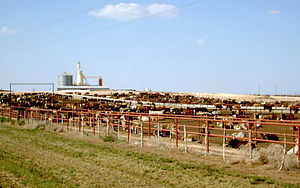
Back Alimento para animales Spanish Azienda-bazka Basque خوراک دام Persian Alimentation animale French Համակցված կերեր Armenian Pakan ID Panganan kéwan JV ಪ್ರಾಣಿ ಆಹಾರ Kannada 동물 사료 Korean Dyrefôr NB
This article needs additional citations for verification. (February 2024) |

Animal feed is food given to domestic animals, especially livestock, in the course of animal husbandry. There are two basic types: fodder and forage. Used alone, the word feed more often refers to fodder. Animal feed is an important input to animal agriculture, and is frequently the main cost of the raising or keeping of animals. Farms typically try to reduce cost for this food, by growing their own, grazing animals, or supplementing expensive feeds with substitutes, such as food waste like spent grain from beer brewing.
Animal wellbeing is highly dependent on feed that reflects a well balanced nutrition. Some modern agricultural practices, such as fattening cows on grains or in feed lots, have detrimental effects on the environment and animals. For example, increased corn or other grain in feed for cows, makes their microbiomes more acidic weakening their immune systems and making cows a more likely vector for E. coli,[1] while other feeding practices can improve animal impacts. For example, feeding cows certain kinds of seaweed, reduces their production of methane, reducing the greenhouse gases from meat production.[2]
When an environmental crisis strikes farmers or herders, such as a drought or extreme weather driven by climate change, farmers often have to shift to more expensive manufactured animal feed, which can negatively effect their economic viability. For example, a 2017 drought in Senegal reduced the availability of grazing lands leading to skyrocketing demand and prices for manufactured animal feed, causing farmers to sell large portions of their herds.[3] Additionally agriculture for producing animal feed puts pressure on land use: feed crops need land that otherwise might be used for human food and can be one of the driving factors for deforestation, soil degradation and climate change.[4]
- ^ "The Bio-Hazard of Corn Fed Beef". Mother Earth News. 2006-12-01. Retrieved 2020-11-27.
- ^ "Seaweed-fed cows could solve livestock industry's methane problems". www.abc.net.au. 2017-04-21. Retrieved 2020-11-27.
- ^ "How climate change is plunging Senegal's herders into poverty". The New Humanitarian. 2018-10-10. Retrieved 2020-11-26.
- ^ Rojas-Downing, M. Melissa; Nejadhashemi, A. Pouyan; Harrigan, Timothy; Woznicki, Sean A. (2017-01-01). "Climate change and livestock: Impacts, adaptation, and mitigation". Climate Risk Management. 16: 145–163. doi:10.1016/j.crm.2017.02.001. ISSN 2212-0963.
© MMXXIII Rich X Search. We shall prevail. All rights reserved. Rich X Search